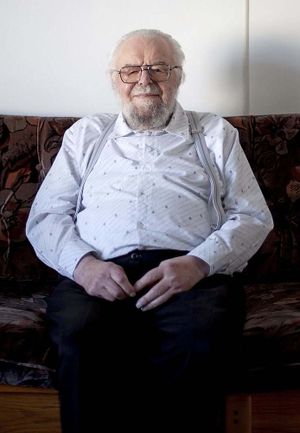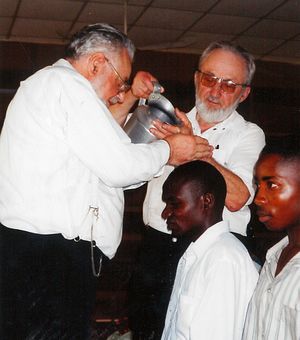Difference between revisions of "Kleinsasser, Jacob (1922-2017)"
AlfRedekopp (talk | contribs) |
AlfRedekopp (talk | contribs) |
||
| Line 42: | Line 42: | ||
[[Category:Persons]] | [[Category:Persons]] | ||
| + | [[Category:Ministers]] | ||
| + | [[Category:Hutterian Brethren Ministers]] | ||
Revision as of 22:33, 10 July 2018
Jacob Kleinsasser was born to Jacob and Katherina (Waldner) Kleinsasser on 2 January 1922, in Milltown Hutterite community in Manitoba. He was the oldest child in a family of 12 children. When the Milltown community purchased the former Blumengart Mennonite village near Plum Coulee, Manitoba, Jacob and his parents were one of the first families sent to live in the new community called the Blumengart community.
In 1938 Blumengart branched out to form Sturgeon Creek community near Headingly, Manitoba. Jacob and his family moved again to the new community. On the 29th of April 1942, Jacob was baptized upon the confession of his faith.
In 1939, when WWII broke out, Jacob and many fellow Hutterites received notice that they would have to report to the Alternative Service camps where they would have to work for the duration of the war. As head-carpenter, Jacob had to make wooden suitcases for all the boys from his home community who were drafted. Eventually, Jacob also received a notice to report to camp. Receiving this notice was a great burden to him, as his mother had just undergone serious surgery. He packed his homemade suitcase and in the company of his father, set out for Winnipeg. Once in Winnipeg, they met up with a group of other Hutterite boys who were also waiting for the train to take them to the Alternative Service Camp. There they had to wait a couple of hours. Jacob decided to visit Judge Adamson at the Winnipeg courthouse to see if he could get a postponement. He explained his situation and mentioned that because of his father’s prolonged and recurring illness, he was needed at home. Judge Adamson listened to him and then without many comments, gave him the requested postponement. When he received his second Alternative Service notice, Jacob again visited Judge Adamson and explained that as head-carpenter in the community, he was needed at home because the community had several building projects on the go. This time Judge Adamson challenged Jacob’s conscientious position demanding to know why Jacob would not participate in the war. Jacob replied that Jesus had taught us to love our enemies, not kill or harm them. Judge Adamson retorted, “But Jesus used force. He took a whip and went into the temple and he drove the people out.” To this Jacob replied, “Well, let the Lord do what he wants, but this is his commandment. After this exchange, Judge Adamson again granted him a postponement.
At 22, Jacob married Katherina Hofer from Sturgeon Creek. Together they had ten children, but tragically, only two of these children survived to adulthood.
In 1946 when Rev. Samuel Kleinsasser of Sturgeon Creek asked the church for a helper, the lot fell to Jacob. At the age of 24, in addition to his responsibility as the community carpenter, Jacob became assistant minister to Rev. Samuel Kleinsasser.
In 1954, Sturgeon Creek purchased land near Ste Agathe, MB and Crystal Spring came into existence. Jacob, his parents, siblings and other brothers and sisters were eventually chosen to move to Crystal Spring.
As a minister, Jacob took on ever more responsibilities. In the 1950s, Jacob assisted elder Joseph Waldner from Poplar Point and later, elder Joseph Kleinsasser from Sunnyside in establishing the Constitution of the Hutterian Brethren Church and Rules as to Community of Property. The new constitution brought together the three Hutterite Leut under one common entity which allowed them to petition the Canadian government jointly.
When elder Joseph Kleinsasser from Sunnyside passed away in 1978, Jacob Kleinsasser was elected to serve as elder of the Schmiedeleut communities. At the age of 56, this was a huge burden for Jacob to bear, because the church entrusted to him faced significant spiritual and financial difficulties. Elder Jacob Kleinsasser and other Schmiedeleut leaders sought ways to stop the spiritual decline. To that end, they strongly supported the relationship with the Bruderhof communities as they saw in them a hope of reformation for the ailing Hutterite church. Unfortunately, not all Hutterite leaders or people shared the elder’s vision and they actively attempted to undermine his work.
In 1992, the Schmiedeleut conference went through a painful schism. The reasons for the schism are too multifaceted and complex to adequately mention here. Suffice it to say that many of the tensions leading up the schism can be clearly traced back years before the eldership of Jacob Kleinsasser. Without a doubt, the 1992 schism will always remain an inescapable part of elder Jacob Kleinsasser’s legacy.
When we reflect on elder Jacob Kleinsasser’s legacy, there are two things that stand out. One is Jacob’s belief that the church had largely failed to carry out Jesus’ great commission “Go into all the world and preach the gospel to the whole creation” (Mark 16). He worked tirelessly to undo this failure. His vision and his compassion for lost souls inspired many Hutterites to look beyond their communities and see the great spiritual and physical needs around the world. Ever since the migrations into the Ukraine and later to North America, Hutterites have largely neglected missional work. For instance, between 1771 and 1791, the Hutterites sent out their last missionaries. Missionary activity during that time was focused primarily on bringing back family members and those left in prison in Transylvania and Hungary when the Hutterites fled the area. During this time, several Mennonite families also joined, including Deckers, Entzs, Knels, and Gross’. In 1876, Michael Waldner (Schmiedmichel) was sent back to Russia to try and convince Hutterites who had remained behind to join their brethren in the Dakotas. With these last, missionary endeavors, the once mighty Hutterite mission machine sputtered and died. Even today (2018), most of the missionary activity practiced by Hutterites is focused on humanitarian aid. The one exception is the Palm Grove Hutterite community in Nigeria. This community was started as a joint mission between the Bruderhof and the Schmiedeleut in Manitoba. When the Bruderhof and the Schmiedeleut ended their relationship in 1995, some of the Manitoba Schmiedeleut communities took over the mission. Sadly, even this modest effort was not fully embraced by all Hutterites then, and not now.
Elder Jacob Kleinsasser will also be remembered for his support and encouragement of those Hutterites who worked tirelessly to improve the education system within the Hutterite communities. During his eldership, Hutterite young men and women were sent to acquire their teacher's training.
Amongst other things, elder Jacob Kleinsasser will be remembered for the many other projects that he inspired and piloted. These include working together with the Bruderhof communities in translating The Chronicle of the Hutterian Brethren (Vol. I & II) from German to English, laying the foundation for the future publishing of The Chronicle of the Hutterian Brethren (Vol. III), collecting and compiling the Hutterite genealogy books for the Schmiedeleut, Lehrerleut, Dariusleut, assisting President Mike Wollmann from Springhill community and the Manitoba Government in establishing the Springhill Hog Processing plant, establishing the HB Mutual Insurance, HB Credit and Providence Christian Services, translating Hutterite teachings from German to English, and establishing a large housing project in Zaire (Democratic Republic of Congo) together with Habitat for Humanity.
Jacob Kleinsasser supported and recognized the value of higher education. He strongly encouraged young people to sing spiritual songs in performing choirs.
In the 1960s, he served as a board member of the Mennonite Central Committee Canada. He encouraged Hutterite communities to donate to agencies like Siloam Mission, Helping Hands, Mennonite Central Committee, and Christian Aid Ministries.
Elder Jacob Kleinsasser passed away peacefully on Tuesday, 8 August 2017 at his home in Crystal Spring at the age of 95.
Bibliography
Redekop, Bill. “Longtime Hutterite leader championed education.” Winnipeg Free Press On line (8 September 2017).
Wollmann, Kenny. “Hutterite elder sought progress, lamented division.” Mennonite Weekly Review On line (5 Septeber 2017)
| Author(s) | Ian Kleinsasser |
|---|---|
| Date Published | July 2018 |
Cite This Article
MLA style
Kleinsasser, Ian. "Kleinsasser, Jacob (1922-2017)." Global Anabaptist Mennonite Encyclopedia Online. July 2018. Web. 16 Apr 2024. https://gameo.org/index.php?title=Kleinsasser,_Jacob_(1922-2017)&oldid=161123.
APA style
Kleinsasser, Ian. (July 2018). Kleinsasser, Jacob (1922-2017). Global Anabaptist Mennonite Encyclopedia Online. Retrieved 16 April 2024, from https://gameo.org/index.php?title=Kleinsasser,_Jacob_(1922-2017)&oldid=161123.
©1996-2024 by the Global Anabaptist Mennonite Encyclopedia Online. All rights reserved.

